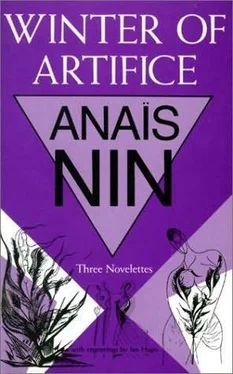Anaïs Nin - The Winter of Artifice
Здесь есть возможность читать онлайн «Anaïs Nin - The Winter of Artifice» весь текст электронной книги совершенно бесплатно (целиком полную версию без сокращений). В некоторых случаях можно слушать аудио, скачать через торрент в формате fb2 и присутствует краткое содержание. Год выпуска: 2007, Издательство: Sky Blue Press, Жанр: Классическая проза, на английском языке. Описание произведения, (предисловие) а так же отзывы посетителей доступны на портале библиотеки ЛибКат.
- Название:The Winter of Artifice
- Автор:
- Издательство:Sky Blue Press
- Жанр:
- Год:2007
- ISBN:нет данных
- Рейтинг книги:4 / 5. Голосов: 1
-
Избранное:Добавить в избранное
- Отзывы:
-
Ваша оценка:
- 80
- 1
- 2
- 3
- 4
- 5
The Winter of Artifice: краткое содержание, описание и аннотация
Предлагаем к чтению аннотацию, описание, краткое содержание или предисловие (зависит от того, что написал сам автор книги «The Winter of Artifice»). Если вы не нашли необходимую информацию о книге — напишите в комментариях, мы постараемся отыскать её.
“A handful of perfectly fold fables, and prose which is so daringly elaborate, so accurately timed… using words as magnificently colorful, evocative and imagist as any plastic combination on canvas but as mysteriously idiosyncratic as any abstract.”
—
The Winter of Artifice — читать онлайн бесплатно полную книгу (весь текст) целиком
Ниже представлен текст книги, разбитый по страницам. Система сохранения места последней прочитанной страницы, позволяет с удобством читать онлайн бесплатно книгу «The Winter of Artifice», без необходимости каждый раз заново искать на чём Вы остановились. Поставьте закладку, и сможете в любой момент перейти на страницу, на которой закончили чтение.
Интервал:
Закладка:
All the layers of his vinous past he laid and unravelled before me, all his masks, his assumed attitudes, his mimicries, his buffooneries. I saw him pretending, driven by obscure revenges, by fears, by weaknesses. I saw him in the world another man from the one I knew. Before me he shed all his poses, all his defences. He was not on his guard to fight for his independence; he was not impelled to lie in order to startle or amuse; he was not urged to cover his timidities with a carapace of callousness.
The legend of hardness, violence and callousness. Like a tale to me, distant and unreal, in contrast to the softness I knew. And I knew which was the rind and which the core of the man.
Just as he loved the falsities and the legends he created around himself, he loved also to rest from these pranks and trickeries and attitudes. He loved to stand there so whole and so certain of what he was deep down, crystallizing in the white heat of my faith.
“You always know,” he said, “what is to be disregarded in me, what must be laughed away, what is unimportant, like the changes of leaves on a tree. You are never deceived about the core.”
Then all the laughter, the shouts, the clownishness and nonsense and reminiscence subsided into a pool of serenity and reflectiveness. His voice became a soft murmur, trailing off in dreamy introspection.
“Why, that sounds as if it might be the beginning of my book, of my Self-Portrait !” he exclaimed.
And when all the gestures and vociferousness and restlessness seemed lulled, suddenly then he sprang up again with a new mood—a fanatic philosopher who walked up and down the room punctuating the torrent of his ideas with fist blows. A nervous, lithe walk, body light and airy, head heavy, the brow ponderous, the glance compact, riveting the phrases. And the voice incandescent. Ideas like leaves on a pyre which never turned to ash—on an everlasting fire. Suddenly the words, the ideas, the memories were all drawn together like the cords of a hundred kites, and he said:
“I’d like to work now.”
In a few moments I heard the crackling of his typewriter.
There remained in the air the echoes of his resonant voice, the hot breath of his words, the vibrations of his pounding gestures, the disturbance created by the gusts of his enthusiasm.
“What would Johanna think,” said Hans, “if she were to blow in now and find us talking about her like two sober craftsmen?”
I had sunk myself into my enjoyment as into a hammock.
“Maybe you’re the woman who will write the truth some day,” he said, “maybe you’ll be the one honest female of our time. Keep that head of yours clear when Johanna comes. Don’t let her delude you.”
“I could say the same to you.”
“You’ll see,” he responded quickly, “I’m another man. I know now what I am. I won’t let her override me. I don’t like what she does to me: she humiliates me. I won’t stand for it any more. I won’t!”
“Maybe you’ll forget all that—with the warmth of her.”
“Huh! Johanna’s warm only when she’s in your arms. Afterwards she’s cold, cold as steel. It’s you that’s truly warm, constantly warm. All you say is warm, all you think is warm, all you write is warm.”
He fell asleep. He rolled over and fell asleep. No noise, no care, no work undone, no imperfection unmastered, no word unsaid ever kept him awake. He could roll over and forget. He could roll over with such a grand indifference and let everything wait. When he rolled over the day ended. Nothing would be carried over into the next day. The next day would be absolutely new and clean. He just rolled over and extinguished everything—work, books, talk, love, laughter, people, himself, the whole world. Just rolling over.
He sat before his third glass of pernod. I looked at the hole in his coat and the stains on his hat.
“In my book,” I said, “all the men will wear glasses and have monumental brows! The women are not thrown on beds but on piles of manuscripts and open books. The dawn is reached and grasped with talk, hunger is stimulated by long discourses. Money is used to supply more paper, more carbons, to rent stronger typewriters.”
“Too realistic,” muttered Hans.
“It’s like the stains on your hat. I’m a woman and you must let me write about human things, trivial things maybe. I leave the problem of form and language to you, together with being and becoming, and physiognomies, and destiny versus incident, and the collapse of reality, and the coming fungoid era, and the middle brain and the tertiary moon… I want to put in all that you leave out. The shape of your hat, for instance. I can tell it from a thousand hats when I see it hanging on a peg. Your hat is like a Rembrandt. It belongs with your Self-Portrait. It’s human and battered, and it’s really not a trivial thing at all—it’s deeply significant. It’s your hat. It’s unique.”
Then I saw the glint in his eyes—the pernod glint, which was really npewritehe pernod but some gem-like layer ofhis being that the drink had peeled away, a glint that was hard, cruel, mischievous. His phrases seemed to break and scatter, to run wild like a machine without springs. They gushed forth from this contradictory core of him.
He was gloating over the childlike pranks he had played on his friends. “There was a guy I used to write pathetic letters to—in New York. Never failed to touch him. And then, as soon as I had gotten the dough, I’d send him a long cable thanking him. I liked to spend his money recklessly. I despised him for being so soft.” He bowed his head in a humble, yet sly way, and laughed softly to himself. “If I had money I would be as hard as nails. I’d never lend a penny to a starving artist. Never! You might as well throw your money down a sewer… You should have seen the two bums I picked up last night—two trollops, I mean. Whew! Were they hideous! I like them that way—the uglier the better. I like beautiful women and I like monstrous women. I don’t know which I like more. Andre was with me. He was peeved. He thought I was being unfaithful to you.”Here he laughed to himself again. “Listen,” he went on, “do you know what’s so awfully good about whores? It’s this: you don’t have to write them long letters. You don’t have to make love to them. There’s nothing gained and there’s nothing lost. It’s the algebra of love. The more grasping they are, the more whorish they are, the better I like them.” And he laughed again, without looking at me. It was a monologue. He was being “sincere” again, “truthful”! This painful sincerity was to prove to everybody that he had learned to embrace the ugly as well as the beautiful.
I looked at the sulphurous-colored pernod and drank it.
Summer evening. We were eating in a small restaurant opposite the Gare Saint Lazare, a restaurant wide open on the street. We were eating in the street and it was as if the street were full of people who were eating and talking and drinking. With each mouthful I swallowed I devoured the noises of the street, the voices and the echoes they dropped, the swift glances which fell on me like a piece of lighted wick from a guttering candle. I was only the finger of a whole bigger body, a body hungry and thirsty and avid. The wine running down my throat passing through the throat of the world. The warmth of the day like a man’s hand on my breasts, the smell of the street like a man’s breath on my neck. Wide open on the street like a field washed by a river.
Shouts and laughter exploded near us from the students going to the Quat’z Arts Bal. Egyptians and Africans in feathers and jewelry, with the sweat shining on the brown painted bodies. They ran to catch the buses and it was like a heaving sea of glistening flesh, soft flesh shining between colored feathers and jewelry, with the muscles swelling when they laughed.
Читать дальшеИнтервал:
Закладка:
Похожие книги на «The Winter of Artifice»
Представляем Вашему вниманию похожие книги на «The Winter of Artifice» списком для выбора. Мы отобрали схожую по названию и смыслу литературу в надежде предоставить читателям больше вариантов отыскать новые, интересные, ещё непрочитанные произведения.
Обсуждение, отзывы о книге «The Winter of Artifice» и просто собственные мнения читателей. Оставьте ваши комментарии, напишите, что Вы думаете о произведении, его смысле или главных героях. Укажите что конкретно понравилось, а что нет, и почему Вы так считаете.











